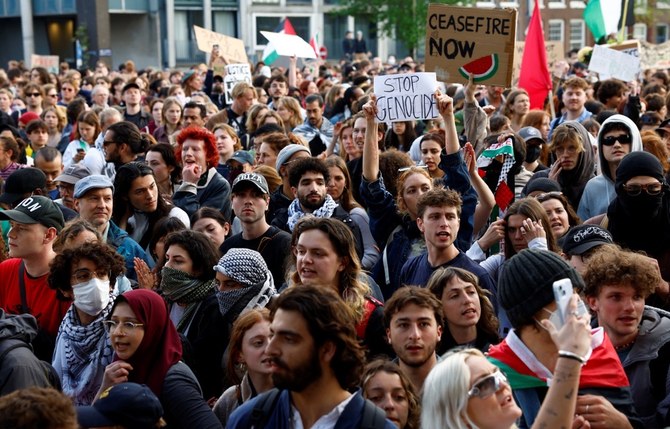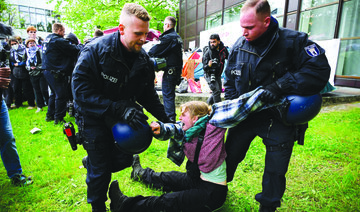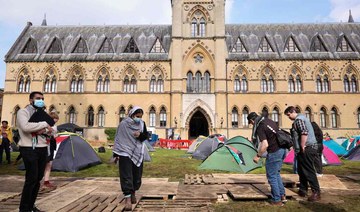AMSTERDAM: Student protests to demand that universities sever ties with Israel over the Gaza war spread in Europe on Tuesday, sparking clashes and arrests as fresh protests broke out in the Netherlands, Germany, France, Switzerland and Austria.
Students at various European universities, inspired by ongoing demonstrations at US campuses, have been occupying halls and facilities, demanding an end to partnerships with Israeli institutions because of Israel’s punishing assault on Gaza.
Several hundred protesters resumed a demonstration on Tuesday evening around the University of Amsterdam campus, where police the previous night were filmed baton-charging them and smashing up their tents after they refused to leave the campus.
As protests resumed on Tuesday night, demonstrators erected barriers to access routes watched over by a heavy police deployment.
Police said in a statement that a total of 169 people had been arrested when officers broke up Monday night’s protests.
All had been released apart from two who remain in custody on suspicion of public disorder offenses.
Violence had briefly erupted on Monday evening when a small group of counter-protesters wielding flares stormed the main protest.
Around 50 demonstrators were also protesting on Tuesday outside the library in Utrecht University and a few dozen at the Technical University of Delft, according to local news agency ANP.
In the eastern German city of Leipzig, the university said in a statement that 50 to 60 people occupied a lecture hall on Tuesday afternoon, waving banners that read: “University occupation against genocide.”
Protesters barricaded the lecture hall doors from the inside and erected tents in the courtyard, according to the university.
The university called in the police in the afternoon, and filed a criminal complaint.
A pro-Israeli counter-protest also took place in the area, involving about 40 people, police said.
Criminal proceedings have been initiated against 13 people who were in the lecture hall on suspicion of trespassing. No arrests have been made so far.
Earlier, at Berlin’s Free University, police cleared a demonstration after up to 80 people erected a protest camp in a courtyard of the campus.
The protesters, some of whom wore the keffiyeh scarf that has long been a symbol of the Palestinian cause, sat in front of tents and waved banners.
They later tried to enter rooms and lecture halls and occupy them, according to the university, which said it then called in the police to clear the protest.
The university said property was damaged while classes in some buildings were suspended for the day.
Berlin police said they made some arrests for incitement to hatred and trespassing.
In Paris, police on Tuesday twice intervened at Paris’s prestigious Sciences Po university to disperse about 20 students who had barricaded themselves in the university’s main hall.
Police moved in to allow other students to take their exams and made two arrests, according to Paris prosecutors. The university said the exams were able to proceed without incident.
Police have intervened several times over the past week at Sciences Po, where protesters are demanding the university reveal its partnerships with Israeli institutions. Some 13 students are on a hunger strike, according to the university.
At the nearby Sorbonne university building, police moved on Tuesday evening to eject about a hundred students who had occupied an amphitheater for two hours to protest about Gaza, police sources said.
In Switzerland, protests on Tuesday spread to three universities in Lausanne Geneva and Zurich.
The University of Lausanne said in a statement that it “considers that there is no reason to cease these relations” with Israeli universities as protesters demand.
In Austria, dozens of protesters have been camped on the campus of Vienna University, putting up tents and stringing up banners since late on Thursday.
The war in the Gaza Strip was sparked by an unprecedented October 7 attack on Israel by the Palestinian group Hamas, which resulted in the deaths of more than 1,170 people, mostly civilians, according to an AFP tally of Israeli official figures.
Vowing to destroy Hamas, Israel launched a retaliatory offensive that has killed at least 34,789 people in Gaza, mostly women and children, according to the Hamas-run territory’s health ministry.
Europe student Gaza protests spread, sparking clashes, arrests
https://arab.news/mhasn
Europe student Gaza protests spread, sparking clashes, arrests

Supporters of Hezbollah and Amal protest in Beirut against security plan

- Security Forces warn against attacks on their units and members
- MP fears concerted campaign against interior minister
BEIRUT: Motorcycle owners in Beirut and the southern suburbs have protested against a security plan launched by the Ministry of Interior in the capital since Monday.
The protests reached their peak with gunfire being exchanged between the protesters and the internal security forces in the heart of the southern suburbs of Beirut.
The situation worsened on Sunday as protesters marched to the Ministry of Interior, claiming that the decision to confiscate unregistered motorcycles was being made randomly and arbitrarily while the vehicle registration office had been closed for years.
Thousands of young men and women have turned to using motorcycles as an alternative to cars since 2019 amid Lebanon’s economic crisis.
The shift has led to a rise in motorcycle thieves targeting people at the entrances of Beirut, particularly on the airport road and highways to the suburbs.
A Lebanese security source said that thieves often seek refuge in Palestinian refugee camps at the entrances of Beirut or in slums in the southern suburbs of Beirut, where illegal weapons are prevalent.
Social media activists shared videos of security forces confiscating motorcycles, while owners claimed the registration service was inaccessible, leading to a lack of registration.
For more than four years, tens of thousands of transactions have accumulated in the vehicle registration department without market licenses, car books, electronic stickers or license plates being issued.
This is due to the crisis of fluctuating exchange rates between the government and contractors — especially contracts in dollars.
In addition to this crisis, corruption investigations are being conducted.
The southern suburbs of Beirut, a stronghold for Hezbollah and the Amal Movement supporters, saw clashes between protesters and security forces on Saturday night.
The supporters held motorcycle rallies to oppose the security plan.
Protesters gathered around the Al-Marija Police Station to chant the message to Interior Minister Bassam Mawlawi that the situation was not under his control.
The Internal Security Forces said that the protesters fired in the air, and the police officers fired in the air to remove them from the site. There was no deaths or injuries among the protesters or the police, as claimed by some social media sites, according to authorities.
The security plan started on May 15, following a meeting of security service leaders 10 days before.
The meeting focused on Beirut’s security due to the increase in pickpocketing, theft, weapon threats and drug trafficking using motorcycles.
The security plan is based on strict measures aimed at maintaining security.
Traffic police units in Beirut and the southern suburbs conduct patrols day and night, with support from various units of the Internal Security Forces, such as the Fuhud forces, the judicial police and others.
Protesters have been blocking main roads with burning tires during afternoon rush hours for days.
Some affected roads include Sports City Road, Mazraa Corniche and the Mar Mikhael-Chiyah intersection.
A political observer expressed concern that “the protest in the heart of the southern suburb of Beirut against one of the state’s police stations may have been carried out with direct cover from Hezbollah, which rejects any disturbance to this environment. Hezbollah maintains a stable security grip in the southern suburb of Beirut while focusing on its war on the southern front against the Israeli army.”
One of the most prominent objections was a statement by the mayor of Ghobeiry, Maan Al-Khalil, who is close to Hezbollah.
The mayor protested against “the confiscation of motorcycles and vehicles belonging to the municipality and driven by municipal employees.”
Beirut MP Nabil Badr said that there was a campaign targeting the interior minister, who is committed to safeguarding the Lebanese people’s safety.
The MP said: “From the start of the security operation, we have urged a comprehensive effort in government agencies, particularly the Car and Motorcycle Registration Department, to help citizens resolve their breaches. The minister has acknowledged the issues and assured that the strict measures will be eased.”
Badr fears that “the campaign aims to create complete chaos in the streets of the capital and its suburbs among those affected by the imposition of security and state prestige. This is something we categorically reject.”
In a statement released on Sunday, the Internal Security Forces rejected “any attacks on their units and members, regardless of the excuses.”
They said that the security plan was requested to protect citizens on public roads from theft, robbery and reckless motorcycle riders, as well as their failure to wear helmets, which has led to an increase in traffic accident deaths.
The security plan aimed to protect people, they said, not to seek revenge or retaliate against them, and, according to authorities, has resulted in a significant decrease in crimes.
Two Saudi startups join climate action accelerator

Two Saudi startups are among the eight companies from the Middle East and North Africa region selected by PepsiCo, SABIC, AstroLabs and partners for their Mega Green Accelerator. The selected participants have all submitted an innovative solution focused on either advancing the circular economy, transitioning to clean energy, or mitigating climate change through technologies to improve water use and agricultural processes. Timed to coincide with this year’s GPCA Plastics Conference, themed “Innovating for Sustainable Growth,” the selected startups also presented to industry leaders who are accelerating the development of a circular economy in the region.

The Mega Green Accelerator will nurture the next generation of innovators as they develop solutions to address both regional and global sustainability challenges. For the next six months, the eight promising change-makers will receive funding, mentorship with industry experts, and market access to scale their innovative solutions. At the end of the program later this year, one winning company will be awarded $30,000 in funding to continue its expansion.
HIGHLIGHT
For the next six months, the eight promising change-makers will receive funding, mentorship with industry experts, and market access to scale their innovative solutions.
A total of 363 submissions were received from sustainable startups in the region during the applications phase. The eight shortlisted companies that will proceed in the program are:
•Mrüna, UAE: A consulting and distribution company dedicated to developing innovative urban solutions.
•The Surpluss, UAE: A climate technology startup that helps SMEs reduce their greenhouse gas emissions profitably through resource sharing via a digital sustainability exchange.
Startups can act as epicenters of innovation, and reshape, disrupt, and define our future.
Eugene Willemsen, CEO, Africa, Middle East, and South Asia, PepsiCo and International Beverages
•Mirai Solar, Saudi Arabia: A solar technology startup that specializes in expanding solar energy use beyond conventional applications, improving the energy use efficiency of food production and smart buildings for a sustainable future.
•Ahya Technologies, Saudi Arabia: A climate software and AI startup building a unified platform for scaling climate action across the Middle East North Africa and Pakistan.
•YY ReGen, Lebanon: The startup provides innovative solutions through the promotion of renewable energy, sustainable water management, and regenerative farming.
•Viridia Tech, Egypt: The startup offers a platform for crop analytics at scale for industrial agricultural companies, leading to significant improvements in yield, unit economics and sustainability metrics.
•P-VITA, Egypt: A biotechnology hub that specializes in producing natural raw materials for cosmetics, and food and beverage industries using AI and IoT technologies to reduce carbon footprint through automated processes.
•Kumulus, Tunisia: A water tech startup that turns air into fresh drinking water through innovative AWG machines — aiming to make drinking water more accessible, sustainable, and economical for hotels and businesses across MENA and Southern European regions.
“With solutions spanning agriculture, water, and the energy sectors, this is an opportunity for us to accelerate the development of practical climate technologies crucial to address the MENA region’s challenges and strengthen our position as a testbed for climate innovation globally. Startups can act as epicenters of innovation, and reshape, disrupt, and define our future. The Mega Green Accelerator provides the incentive to bolster this through cross-sector collaboration and nurture the region’s next generation of entrepreneurs by providing the needed mentorship, funding, and market access,” said Eugene Willemsen, CEO, Africa, Middle East, and South Asia, PepsiCo and CEO of International Beverages.
“Over 300 fast-growing sustainability companies from all over the MENA region have applied to the program, showcasing a healthy influx of sustainable solutions and rapid growth in the sector. The selection of these eight companies underscores their readiness for scale, marking a pivotal time in the sector’s development. The Mega Green Accelerator is setting the stage for a robust sustainability infrastructure, bridging the gap between these companies, and the resources necessary for them to thrive, scale, and translate their innovative solutions into regional impact,” said Roland Daher, CEO of AstroLabs.
Strategic investment partners like Dubai Future District Fund, Venture Souq and Shurooq Partners will provide platforms for investment opportunities, mentorship in raising capital, and networking opportunities throughout the term of the Mega Green Accelerator. Schneider Electric will support the Mega Green Accelerator as a prize partner alongside participating in the final selection of the winner.
SEREDO 2024 showcases housing projects

Deputy Minister of Municipal Rural Affairs and Housing Talal bin Mohammed Al-Khunaini on May 14 inaugurated the second edition of the Saudi Real Estate Development and Ownership exhibition in Jeddah.
Held at the Jeddah International Exhibition and Convention Center, the four-day event explored promising opportunities in the real estate development sector, while offering a platform for exchanging expertise, transferring best practices and experiences among professionals in the field, and strengthening local and international partnerships. The exhibition brought together leading real estate developers, providing an opportunity for companies to showcase their real estate products to specialists and interested individuals in the sector, and to foster new partnerships.
The exhibition covered a variety of topics related to the sector through its diverse sessions, notably including discussions on real estate sector developments and analysis of modern market trends, the utilization of geospatial data and its impact on shaping new horizons in real estate, methods and strategies to professionalize real estate auctions, entrepreneurship and innovation in the real estate market, real estate funds, and negotiation techniques for real estate brokers.
These sessions featured the participation of officials, speakers, and specialists in the sector.
SEREDO 2024 witnessed the participation of several major real estate development companies, banks, and financial institutions. The event showcased the latest housing projects and financing offers for citizens, contributing to the development and sustainability of the real estate sector and enhancing housing diversity and financing solutions to support the goals of the housing program — one of the key initiatives of the Kingdom’s Vision 2030, aiming to achieve a 70 percent homeownership target.
Fresh floods kill 66 in northern Afghanistan

- Hundreds of people have died in flash floods this month that have also swamped agricultural lands in Afghainstan
- The latest heavy floods hit multiple districts of Faryab province Saturday, resulting in human and financial losses
KABUL: Fresh floods killed 66 people in northern Afghanistan, a provincial official said Sunday, after weeks of flooding that has inundated farms and villages and swept away swathes of communities.
Hundreds of people have died in flash floods this month that have also swamped agricultural lands in a country where 80 percent of the population depends on farming to survive.
The latest heavy floods hit multiple districts of Faryab province on Saturday night and “resulted in human and financial losses,” said Asmatullah Muradi, spokesman for the Faryab governor, in a statement.
“Due to the floods 66 people were killed,” he said, adding that at least five people were injured and others were still missing.
The flooding damaged more than 1,500 houses, swamped more than 1,000 acres of agricultural land and killed hundreds of livestock, he said.
The floods came a day after provincial police said more than 50 people were killed in flash flooding in the western province of Ghor.
Just over a week ago, more than 300 people were killed by torrents in northern Baghlan province, according to the UN World Food Programme (WFP) and Taliban officials.
Taliban officials have warned the tolls would go up in regions impacted by flooding, as destroyed infrastructure hampered aid delivery and efforts to find the missing.
The death toll from the Ghor flooding rose from 50 to 55 on Sunday, according to Abdul Wahid Hamas, a spokesman for the provincial governor.
“More than 3,000 homes were totally destroyed due to the floods” in Ghor, he added.
Videos shared on social media platform X by the WFP showed currents of brown water crashing through walls of homes and churning through streets in Ghor.
Residents in Baghlan, Ghor, Faryab and other affected provinces found themselves without shelter, stripped of their homes and livelihoods.
“We were inside our home when rain started and all of a sudden, a flash flood came, we were trying to get things out but it washed away our home, our life, everything,” Ghor resident Jawan Gul told AFP on Saturday.
The flooding also sparked concern for the revered 12th-century Jam minaret, located in a remote part of Ghor, provincial officials said.
Images circulated to media showed brown torrents crashing around the base of the UNESCO World Heritage Site.
“The situation of Jam was very concerning,” Abdul Hai Zaeem, information and culture director in Ghor, told AFP, adding that mud was still piled high around the brick minaret.
The WFP warned that the recent floods have compounded an already dire humanitarian situation in the impoverished country.
Spring floods are not uncommon in Afghanistan, a country of more than 40 million people, but above-average rainfall this year has sparked devastating flash flooding.
Even before the most recent spate of floods, about 100 people had been killed from mid-April to early May as a result of flooding in 10 of Afghanistan’s provinces, authorities said.
The rains come after a prolonged drought in Afghanistan, which is one of the least prepared nations to tackle climate change impacts, according to experts.
Anti-microbial resistance causing 1 million deaths in Pakistan annually — health experts

- Self-medication, unjustified prescription, taking antibiotics for shorter duration major reasons of antimicrobial resistance
- Officials and public health experts urge people not to use antibiotics without the advice of trained and qualified physicians
KARACHI: Antimicrobial resistance (AMR) is the third leading cause of deaths in Pakistan that directly or indirectly results in 1 million deaths in the South Asian country annually, officials and public health experts said on Sunday.
They said this at a press conference in Karachi in connection with the National Antimicrobial Stewardship Summit 2024, organized by Getz Pharma drug manufacturer in collaboration with the National Health Services Ministry, Health Services Academy (HSA) and the National Institute of Health (NIH).
Around 300,000 people die annually due to drug-resistant bacteria, while AMR contributes to 700,000 deaths because of complications following treatment of diseases, according to the experts.
The deaths are linked with “irrational use” of antibiotics as Pakistan is the third largest consumer of antibiotics in the world, after China and India, and consumed antibiotics worth Rs126 billion in 2023 alone.
“Antimicrobial resistance is now the third leading cause of death after cardiovascular disease and maternal and neonatal disorders in Pakistan because we now have infections caused by bacteria that are not responding to third- and fourth-generation antibiotics,” said Prof. Shahzad Ali Khan, vice-chancellor of the Health Services Academy in Islamabad.
“Abuse of antibiotics by doctors, quacks, and people themselves is making these important medicines highly ineffective,” he said, urging people not to use antibiotics without the advice of trained and qualified physicians.
The summit was attended by over 1,400 health care professionals, including health secretaries and directors-general from federal and provincial governments, officials from the NIH, Drug Regulatory Authority of Pakistan, medical societies and health care regulatory authorities, senior physicians and policymakers.
Khan maintained that antibiotics were “wonder drugs” that saved millions of lives during world wars and pandemics, but their “irrational use or abuse” had led to AMR, which was now becoming a global public health concern.
“Self-medication, unjustified prescription of antibiotics by quacks and physicians, taking antibiotics for a shorter duration, and the production of substandard antibiotics by some companies are some of the major causes of antimicrobial resistance,” he said.
Prof. Javed Akram, former Punjab health minister and president of the Pakistan Society of Internal Medicine (PSIM), said AMR was the third major challenge facing Pakistan after population growth and non-communicable diseases (NCDs).
“People are now dying due to infections that are extremely hard to treat due to the resistance developed by bacteria against these medicines,” Akram said.
“On one hand, Pakistan has become the world capital of diabetes and other non-communicable diseases, and on the other, we have developed Extremely Drug-Resistant (XDR) typhoid, Multi-Drug Resistant (MDR) TB, and various other infections that are extremely hard to treat with most of the available antibiotics. This is because we have been using antibiotics like candies.”
He urged people not to consume antibiotics on their own, saying antibiotics have similar side effects as cancer treatment therapies.
Dr. Afreenish Amir, an NIH representative and senior microbiologist, said AMR had spread to almost all countries and regions, including Pakistan, owing to the “misuse and overuse” of antibiotics.
“This contributes to the increasing burden of infections due to resistant bacteria while limiting treatment options for managing such infections,” she said.
The experts also highlighted the “overuse and abuse” of antibiotics for livestock and said it was responsible for 80 percent of AMR in the veterinary sector. They called for creating awareness among the masses regarding the irrational use of antibiotics in humans, livestock and poultry.
In his keynote address, Prof. Zulfiqar Bhutta, a renowned pediatrician and public health scientist, urged people to get their children vaccinated against typhoid, saying Pakistan was the only country in the world where the Typhoid Conjugate Vaccine (TCV) was being administered to children to prevent the drug-resistant, water-borne disease.
Dr. Wajiha Javed, an associate director of public health at Getz Pharma, said over-the-counter availability of antibiotics, use of these medicines for a shorter duration, and unnecessary prescription of antibiotics by quacks and doctors should be looked into by the authorities.
She said substandard antibiotics containing less or low-grade raw materials were also responsible for AMR and announced that her firm was working work with the government to develop a national action plan on AMR.
On the occasion, a declaration was also signed between the Health Services Academy, NIH and Getz Pharma for the implementation of Antimicrobial Stewardship (AMS), while Memorandums of Understanding (MoUs) were also signed with 13 medical societies in this regard.















